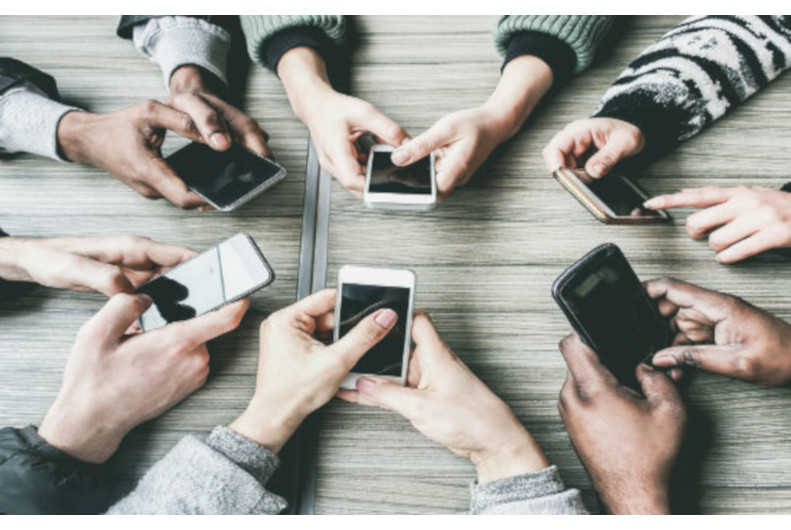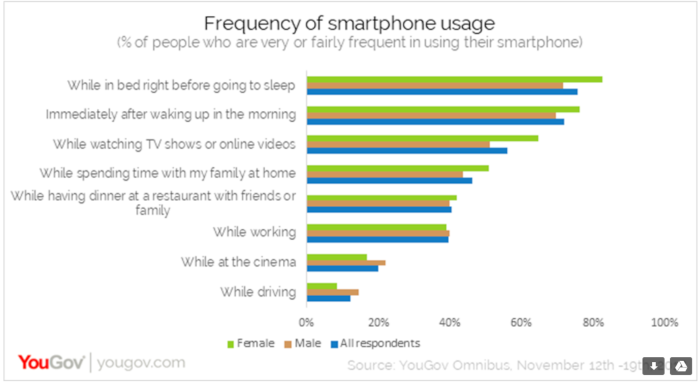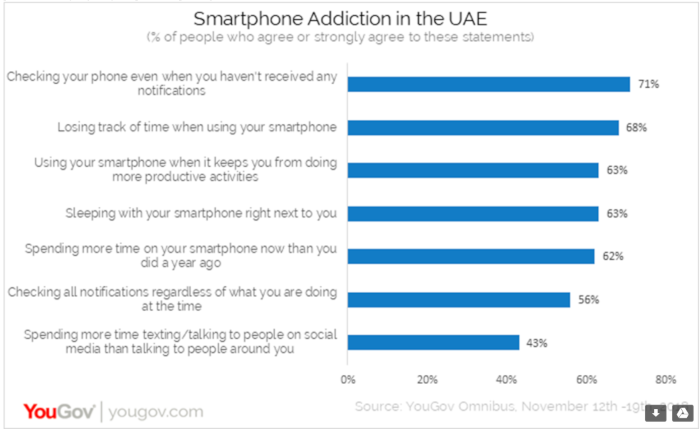 The addictive nature of smartphones is becoming prevalent over the years. The Middle East being no exception. A recent YouGov survey reveals nine in 10 respondents in the UAE own a smartphone currently, with 70 percent of those who do not own one planning to purchase one in the near future.
The addictive nature of smartphones is becoming prevalent over the years. The Middle East being no exception. A recent YouGov survey reveals nine in 10 respondents in the UAE own a smartphone currently, with 70 percent of those who do not own one planning to purchase one in the near future.
On an average people claimed to spend 6.5 hours on their smartphone every day, with women spending more time (average of 7 hours) than men (average of 6 hours).
Not surprisingly, the usage among younger age groups also exceeds the overall daily average, with those aged between 18- 29 years spending an average of seven hours a day stuck to their phones.
Addiction
In terms of frequency of use, 76 percent of respondents admitted to very frequently looking at their phone while in bed right before sleeping while 72 percent claim to reach for their device immediately after waking up in the morning.
Mobile distraction is common even while watching TV shows, online videos (56%), while dining in a restaurant with friends and family (41%), while working (40%) and even at the cinema (20%).

Emiratis (31%) and Arab Expats (21%) are most likely to indulge with their phones at the cinema. A small proportion (12%) even admit to frequently using their phones while driving, with 21 percent of Emiratis confessing to this dangerous habit. Men also report being more likely to be distracted by their phone while on the road, with 14 percent of them checking their device compared to 8 percent women.
Checking or posting on social media (53%), texting or messaging (41%) and checking or replying to emails (35%) emerged as the top activities people engage in on their smartphones. One again, women surpass men in being more indulgent with messaging or posting on social media and in taking photos on their phones.
Facebook appeared as the most popular social media app used by people on their smartphones for the majority, followed by YouTube (67%) and Instagram (54%). While comparatively, Facebook and YouTube emerge as more popular among males, Instagram and Snapchat are the clear winners among women.
“Smartphones have become intertwined with our daily routine and it seems our reliance on them is ever increasing. One of the most worrying points from this piece is the percentage of people who openly admit to spending more time messaging/talking through social media than actually conversing with people in the world around us,” said Kerry Mclaren, Head of Omnibus.
With & Without
The attachment to the phone is as much of a worry as the detachment. Around 63 percent of respondents admit to feeling uncomfortable without access to their smartphone. The majority of people (87%) claimed they could not do without their phone for more than a day.
Nearly 41 percent of respondents cannot go for more than two hours without their phones, with a further 17 percent saying they can only function less than an hour without their phone before it starts bothering them. Women (21%) are more likely to be perturbed if they go more than an hour without their phone as compared to men (14%). Emiratis and Arab expats (both 20%) are also more likely to have this problem when compared to Asian expats and Westerners.

This mobile interaction seems to have also taken a toll on their social life with 43 percent saying they spend more time texting or talking to people on social media than they do interacting with people around them. 56 percent claim to immediately check their notifications regardless of what they are doing at that time while 71 percent check their phone for updates even when they haven’t received any notifications.
Around four out of five respondents frequently use smartphones to mindlessly pass time. 68 percent admitted to losing track of time when using their phone and 63 percent say they always sleep with their phone right beside them.
It appears that respondents recognize a trend of increased activity on their device with around six in 10 respondents saying they spend more time on their phone now than they did a year ago and 63 percent saying they frequently use their phone even when it keeps them away from more productive activities.
“The fact that we are spending a quarter of our day glued to our mobile screen is a cause for concern as we are missing so much of what is actually going on around us. Apart from affecting our productivity, this unhealthy dependency can have a serious impact on our mental health and relationships. There is a need to create more awareness around how distracted we really are and look at ways to tackle the problem, creating a balance,” Ms Mclaren explained.
Unplugging
Although addiction to smartphones is unavoidable in today’s digital age, three-quarter of respondents regularly take steps to limit their phone usage. The most prominent steps consumers are putting in place are to put their phone on silent (41%), limit the apps installed (30%), keeping the phone out of reach (25%) and adjusting the settings to receive fewer notifications (21%).
In other steps of reduction, one in five respondents stated not using their phone during specific times of the day, with evening taking priority for screen time. Right after waking up and the first half of the day when work starts emerged as the most common times when people avoid using their phones.
“We do see positive steps coming from tech giants like Apple who are offering ways to track/limit phone usage but people themselves need to recognize the habits they may have developed and make conscious efforts to balance their day between technology and the life around them,” Ms Mclaren added.




